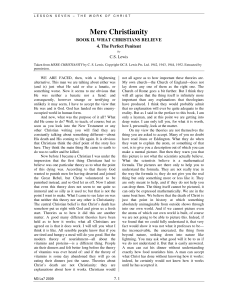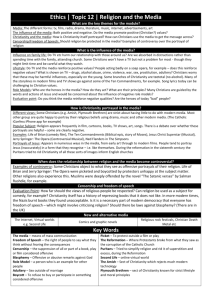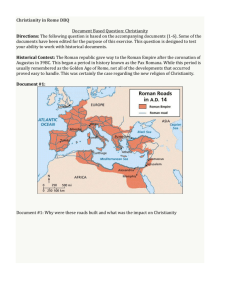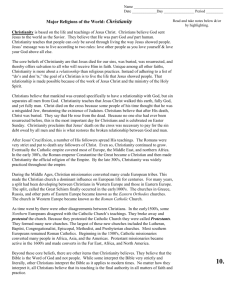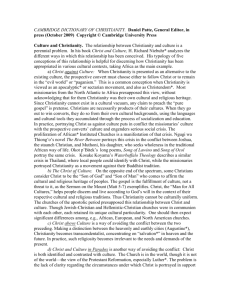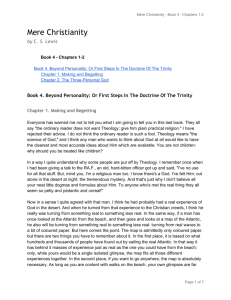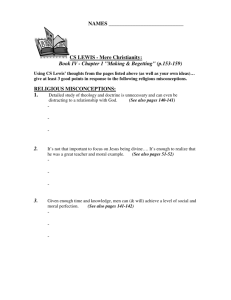Mere Christianity
advertisement
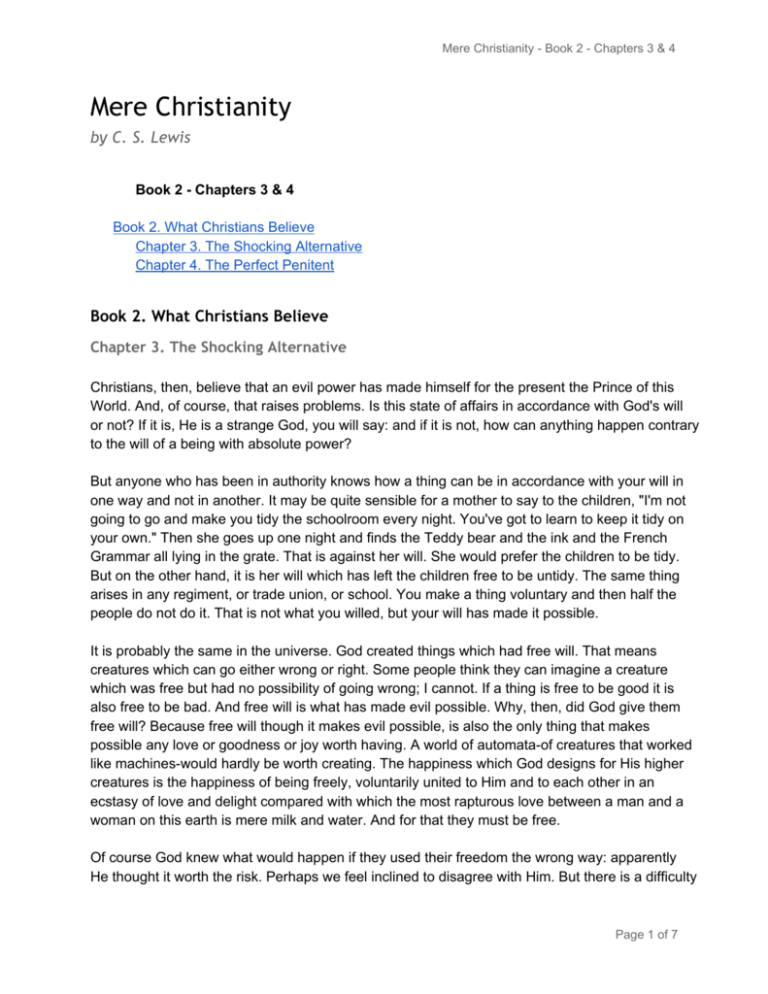
Mere Christianity ­ Book 2 ­ Chapters 3 & 4 Mere Christianity by C. S. Lewis Book 2 ­ Chapters 3 & 4 Book 2. What Christians Believe Chapter 3. The Shocking Alternative Chapter 4. The Perfect Penitent Book 2. What Christians Believe Chapter 3. The Shocking Alternative Christians, then, believe that an evil power has made himself for the present the Prince of this World. And, of course, that raises problems. Is this state of affairs in accordance with God's will or not? If it is, He is a strange God, you will say: and if it is not, how can anything happen contrary to the will of a being with absolute power? But anyone who has been in authority knows how a thing can be in accordance with your will in one way and not in another. It may be quite sensible for a mother to say to the children, "I'm not going to go and make you tidy the schoolroom every night. You've got to learn to keep it tidy on your own." Then she goes up one night and finds the Teddy bear and the ink and the French Grammar all lying in the grate. That is against her will. She would prefer the children to be tidy. But on the other hand, it is her will which has left the children free to be untidy. The same thing arises in any regiment, or trade union, or school. You make a thing voluntary and then half the people do not do it. That is not what you willed, but your will has made it possible. It is probably the same in the universe. God created things which had free will. That means creatures which can go either wrong or right. Some people think they can imagine a creature which was free but had no possibility of going wrong; I cannot. If a thing is free to be good it is also free to be bad. And free will is what has made evil possible. Why, then, did God give them free will? Because free will though it makes evil possible, is also the only thing that makes possible any love or goodness or joy worth having. A world of automata­of creatures that worked like machines­would hardly be worth creating. The happiness which God designs for His higher creatures is the happiness of being freely, voluntarily united to Him and to each other in an ecstasy of love and delight compared with which the most rapturous love between a man and a woman on this earth is mere milk and water. And for that they must be free. Of course God knew what would happen if they used their freedom the wrong way: apparently He thought it worth the risk. Perhaps we feel inclined to disagree with Him. But there is a difficulty Page 1 of 7 Mere Christianity ­ Book 2 ­ Chapters 3 & 4 about disagreeing with God. He is the source from which all your reasoning power comes: you could not be right and He wrong any more than a stream can rise higher than its own source. When you are arguing against Him you are arguing against the very power that makes you able to argue at all: it is like cutting off the branch you are sitting on. If God thinks this state of war in the universe a price worth paying for free will­that is, for making a live world in which creatures can do real good or harm and something of real importance can happen, instead of a toy world which only moves when He pulls the strings­then we may take it it is worth paying. When we have understood about free will, we shall see how silly it is to ask, as somebody once asked me: "Why did God make a creature of such rotten stuff that it went wrong?" The better stuff a creature is made of­the cleverer and stronger and freer it is­then the better it will be if it goes right, but also the worse it will be if it goes wrong. A cow cannot be very good or very bad; a dog can be both better and worse; a child better and worse still; an ordinary man, still more so; a man of genius, still more so; a superhuman spirit best­or worst­of all. How did the Dark Power go wrong? Here, no doubt, we ask a question to which human beings cannot give an answer with any certainty. A reasonable (and traditional) guess, based on our own experiences of going wrong, can, however, be offered. The moment you have a self at all, there is a possibility of putting Yourself first­wanting to be the centre­wanting to be God, in fact. That was the sin of Satan: and that was the sin he taught the human race. Some people think the fall of man had something to do with sex, but that is a mistake. (The story in the Book of Genesis rather suggests that some corruption in our sexual nature followed the fall and was its result, not its cause.) What Satan put into the heads of our remote ancestors was the idea that they could "be like gods"­could set up on their own as if they had created themselves­be their own masters­invent some sort of happiness for themselves outside God, apart from God. And out of that hopeless attempt has come nearly all that we call human history­money, poverty, ambition, war, prostitution, classes, empires, slavery­the long terrible story of man trying to find something other than God which will make him happy. The reason why it can never succeed is this. God made us: invented us as a man invents an engine. A car is made to run on gasoline, and it would not run properly on anything else. Now God designed the human machine to run on Himself. He Himself is the fuel our spirits were designed to burn, or the food our spirits were designed to feed on. There is no other. That is why it is just no good asking God to make us happy in our own way without bothering about religion. God cannot give us a happiness and peace apart from Himself, because it is not there. There is no such thing. That is the key to history. Terrific energy is expended­civilisations are built up­excellent institutions devised; but each time something goes wrong. Some fatal flaw always brings the selfish and cruel people to the top and it all slides back into misery and ruin. In fact, the machine conks. It seems to start up all right and runs a few yards, and then it breaks down. They are trying to run it on the wrong juice. That is what Satan has done to us humans. Page 2 of 7 Mere Christianity ­ Book 2 ­ Chapters 3 & 4 And what did God do? First of all He left us conscience, the sense of right and wrong: and all through history there have been people trying (some of them very hard) to obey it. None of them ever quite succeeded. Secondly, He sent the human race what I call good dreams: I mean those queer stories scattered all through the heathen religions about a god who dies and comes to life again and, by his death, has somehow given new life to men. Thirdly, He selected one particular people and spent several centuries hammering into their heads the sort of God He was ­that there was only one of Him and that He cared about right conduct. Those people were the Jews, and the Old Testament gives an account of the hammering process. Then comes the real shock. Among these Jews there suddenly turns up a man who goes about talking as if He was God. He claims to forgive sins. He says He has always existed. He says He is coming to judge the world at the end of time. Now let us get this clear. Among Pantheists, like the Indians, anyone might say that he was a part of God, or one with God: there would be nothing very odd about it. But this man, since He was a Jew, could not mean that kind of God. God, in their language, meant the Being outside the world Who had made it and was infinitely different from anything else. And when you have grasped that, you will see that what this man said was, quite simply, the most shocking thing that has ever been uttered by human lips. One part of the claim tends to slip past us unnoticed because we have heard it so often that we no longer see what it amounts to. I mean the claim to forgive sins: any sins. Now unless the speaker is God, this is really so preposterous as to be comic. We can all understand how a man forgives offences against himself. You tread on my toe and I forgive you, you steal my money and I forgive you. But what should we make of a man, himself unrobbed and untrodden on, who announced that he forgave you for treading on other men's toes and stealing other men's money? Asinine fatuity is the kindest description we should give of his conduct. Yet this is what Jesus did. He told people that their sins were forgiven, and never waited to consult all the other people whom their sins had undoubtedly injured. He unhesitatingly behaved as if He was the party chiefly concerned, the person chiefly offended in all offences. This makes sense only if He really was the God whose laws are broken and whose love is wounded in every sin. In the mouth of any speaker who is not God, these words would imply what I can only regard as a silliness and conceit unrivalled by any other character in history. Yet (and this is the strange, significant thing) even His enemies, when they read the Gospels, do not usually get the impression of silliness and conceit. Still less do unprejudiced readers. Christ says that He is "humble and meek" and we believe Him; not noticing that, if He were merely a man, humility and meekness are the very last characteristics we could attribute to some of His sayings. I am trying here to prevent anyone saying the really foolish thing that people often say about Him: "I'm ready to accept Jesus as a great moral teacher, but I don't accept His claim to be God." That is the one thing we must not say. A man who was merely a man and said the sort of things Jesus said would not be a great moral teacher. He would either be a lunatic­on a level with the man who says he is a poached egg­or else he would be the Devil of Hell. You must make your Page 3 of 7 Mere Christianity ­ Book 2 ­ Chapters 3 & 4 choice. Either this man was, and is, the Son of God: or else a madman or something worse. You can shut Him up for a fool, you can spit at Him and kill Him as a demon; or you can fall at His feet and call Him Lord and God. But let us not come with any patronising nonsense about His being a great human teacher. He has not left that open to us. He did not intend to. Chapter 4. The Perfect Penitent We are faced, then, with a frightening alternative. This man we are talking about either was (and is) just what He said or else a lunatic, or something worse. Now it seems to me obvious that He was neither a lunatic nor a fiend: and consequently, however strange or terrifying or unlikely it may seem, I have to accept the view that He was and is God. God has landed on this enemy­occupied world in human form. And now, what was the purpose of it all? What did He come to do? Well, to teach, of course; but as soon as you look into the New Testament or any other Christian writing you will find they are constantly talking about something different­about His death and His coming to life again. It is obvious that Christians think the chief point of the story lies here. They think the main thing He came to earth to do was to suffer and be killed. Now before I became a Christian I was under the impression that the first thing Christians had to believe was one particular theory as to what the point of this dying was. According to that theory God wanted to punish men for having deserted and joined the Great Rebel, but Christ volunteered to be punished instead, and so God let us off. Now I admit that even this theory does not seem to me quite so immoral and so silly as it used to; but that is not the point I want to make. What I came to see later on was that neither this theory nor any other is Christianity. The central Christian belief is that Christ's death has somehow put us right with God and given us a fresh start Theories as to how it did this are another matter. A good many different theories have been held as to how it works; what all Christians are agreed on is that it does work. I will tell you what I think it is like. All sensible people know that if you are tired and hungry a meal will do you good. But the modern theory of nourishment­all about the vitamins and proteins­is a different thing. People ate their dinners and felt better long before the theory of vitamins was ever heard of: and if the theory of vitamins is some day abandoned they will go on eating their dinners just the same. Theories about Christ's death are not Christianity: they are explanations about how it works. Christians would not all agree as to how important these theories are. My own church­the Church of England­does not lay down any one of them as the right one. The Church of Rome goes a bit further. But I think they will all agree that the thing itself is infinitely more important than any explanations that theologians have produced. I think they would probably admit that no explanation will ever be quite adequate to the reality. But as I said in the preface to this book, I am only a layman, and at this point we are getting into deep water. I can only tell you, for what it is worth, how I, personally, look at the matter. Page 4 of 7 Mere Christianity ­ Book 2 ­ Chapters 3 & 4 On my view the theories are not themselves the thing you are asked to accept. Many of you no doubt have read Jeans or Eddington. What they do when they want to explain the atom, or something of that sort, is to give you a description out of which you can make a mental picture. But then they warn you that this picture is not what the scientists actually believe. What the scientists believe is a mathematical formula. The pictures are there only to help you to understand the formula. They are not really true in the way the formula is; they do not give you the real thing but only something more or less like it. They are only meant to help, and if they do not help you can drop them. The thing itself cannot be pictured, it can only be expressed mathematically. We are in the same boat here. We believe that the death of Christ is just that point in history at which something absolutely unimaginable from outside shows through into our own world. And if we cannot picture even the atoms of which our own world is built, of course we are not going to be able to picture this. Indeed, if we found that we could fully understand it, that very fact would show it was not what it professes to be­the inconceivable, the uncreated, the thing from beyond nature, striking down into nature like lightning. You may ask what good will it be to us if we do not understand it. But that is easily answered. A man can eat his dinner without understanding exactly how food nourishes him. A man can accept what Christ has done without knowing how it works: indeed, he certainly would not know how it works until he has accepted it. We are told that Christ was killed for us, that His death has washed out our sins, and that by dying He disabled death itself. That is the formula. That is Christianity. That is what has to be believed. Any theories we build up as to how Christ's death did all this are, in my view, quite secondary: mere plans or diagrams to be left alone if they do not help us, and, even if they do help us, not to be confused with the thing itself. All the same, some of these theories are worth looking at. The one most people have heard is the one I mentioned before ­the one about our being let off because Christ had volunteered to bear a punishment instead of us. Now on the face of it that is a very silly theory. If God was prepared to let us off, why on earth did He not do so? And what possible point could there be in punishing an innocent person instead? None at all that I can see, if you are thinking of punishment in the police­court sense. On the other hand, if you think of a debt, there is plenty of point in a person who has some assets paying it on behalf of someone who has not. Or if you take "paying the penalty," not in the sense of being punished, but in the more general sense of "standing the racket" or "footing the bill," then, of course, it is a matter of common experience that, when one person has got himself into a hole, the trouble of getting him out usually falls on a kind friend. Now what was the sort of "hole" man had got himself into? He had tried to set up on his own, to behave as if he belonged to himself. In other words, fallen man is not simply an imperfect creature who needs improvement: he is a rebel who must lay down his arms. Laying down your arms, surrendering, saying you are sorry, realising that you have been on the wrong track and getting ready to start life over again from the ground floor­that is the only way out of a "hole." This process of surrender­this movement full speed astern­is what Christians call repentance. Now repentance is no fun at all. It is something much harder than merely eating humble pie. It means unlearning all the self­conceit and self­will that we have been training ourselves into for thousands of years. It means killing part of yourself, undergoing a kind Page 5 of 7 Mere Christianity ­ Book 2 ­ Chapters 3 & 4 of death. In fact, it needs a good man to repent. And here comes the catch. Only a bad person needs to repent: only a good person can repent perfectly. The worse you are the more you need it and the less you can do it. The only person who could do it perfectly would be a perfect person­and he would not need it. Remember, this repentance, this willing submission to humiliation and a kind of death, is not something God demands of you before He will take you back and which He could let you off if He chose: it is simply a description of what going back to Him is like. If you ask God to take you back without it, you are really asking Him to let you go back without going back. It cannot hap pen. Very well, then, we must go through with it. But the same badness which makes us need it, makes us unable to do it. Can we do it if God helps us? Yes, but what do we mean when we talk of God helping us? We mean God putting into us a bit of Himself, so to speak. He lends us a little of His reasoning powers and that is how we think: He puts a little of His love into us and that is how we love one another. When you teach a child writing, you hold its hand while it forms the letters: that is, it forms the letters because you are forming them. We love and reason because God loves and reasons and holds our hand while we do it. Now if we had not fallen, that would be all plain sailing. But unfortunately we now need God's help in order to do something which God, in His own nature, never does at all­to surrender, to suffer, to submit, to die. Nothing in God's nature corresponds to this process at all. So that the one road for which we now need God's leadership most of all is a road God, in His own nature, has never walked. God can share only what He has: this thing, in His own nature, He has not. But supposing God became a man­suppose our human nature which can suffer and die was amalgamated with God's nature in one person­then that person could help us. He could surrender His will, and suffer and die, because He was man; and He could do it perfectly because He was God. You and I can go through this process only if God does it in us; but God can do it only if He becomes man. Our attempts at this dying will succeed only if we men share in God's dying, just as our thinking can succeed only because it is a drop out of the ocean of His intelligence: but we cannot share God's dying unless God dies; and He cannot die except by being a man. That is the sense in which He pays our debt, and suffers for us what He Himself need not suffer at all. I have heard some people complain that if Jesus was God as well as man, then His sufferings and death lose all value in their eyes, "because it must have been so easy for him." Others may (very rightly) rebuke the ingratitude and ungraciousness of this objection; what staggers me is the misunderstanding it betrays. In one sense, of course, those who make it are right. They have even understated their own case. The perfect submission, the perfect suffering, the perfect death were not only easier to Jesus because He was God, but were possible only because He was God. But surely that is a very odd reason for not accepting them? The teacher is able to form the letters for the child because the teacher is grown­up and knows how to write. That, of course, makes it easier for the teacher, and only because it is easier for him can he help the child. If it rejected him because "it's easy for grown­ups" and waited to learn writing from another child who could not write itself (and so had no "unfair" advantage), it would not get on very Page 6 of 7 Mere Christianity ­ Book 2 ­ Chapters 3 & 4 quickly. If I am drowning in a rapid river, a man who still has one foot on the bank may give me a hand which saves my life. Ought I to shout back (between my gasps) "No, it's not fair! You have an advantage! You're keeping one foot on the bank"? That advantage­call it "unfair" if you like­is the only reason why he can be of any use to me. To what will you look for help if you will not look to that which is stronger than yourself? Such is my own way of looking at what Christians call the Atonement. But remember this is only one more picture. Do not mistake it for the thing itself: and if it does not help you, drop it. Page 7 of 7

